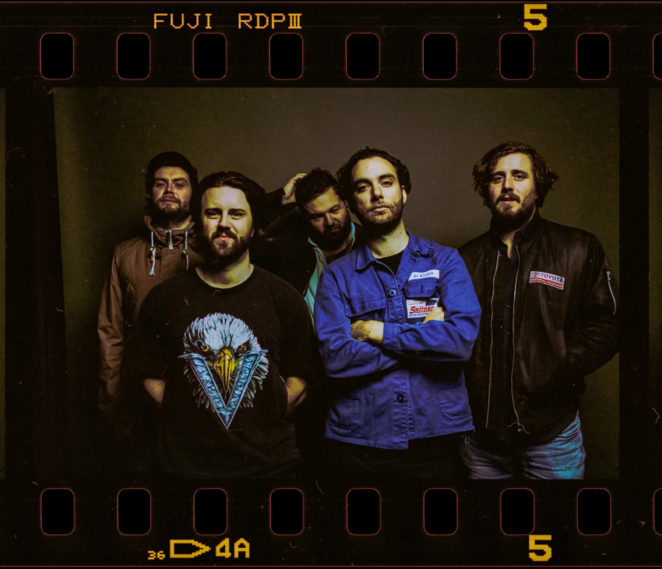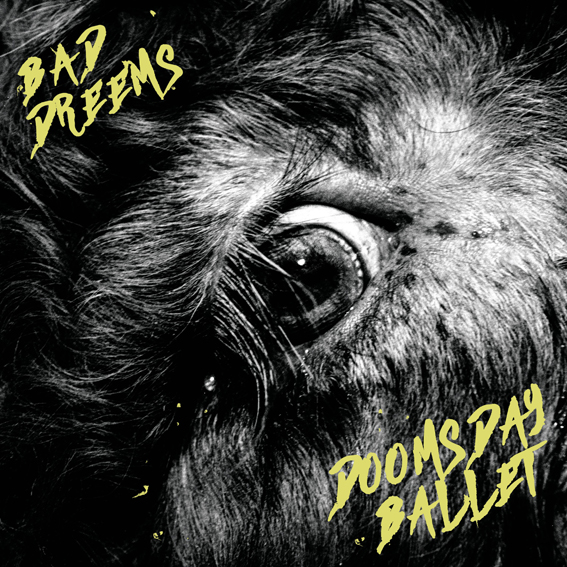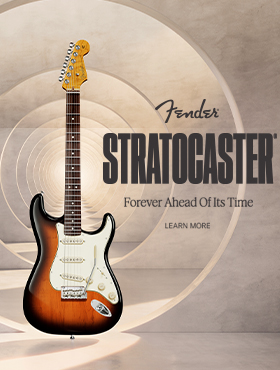
“It’s pretty weird, none of us have ever been in a band where we have had two albums to choose from and now we have three, so it will be interesting having too many songs,” Bad//Dreems guitarist Alex Cameron tells me as he contemplates the set list for the band’s upcoming tour which kicks off on October 25 at The Triffid in Brisbane. Bad//Dreems have indeed just released their 3rd album. It’s called Doomsday Ballet and sees the band further developing their sound and songcraft. Alex is as surprised as anyone that a group of mates who hurriedly slapped together a band name to fulfil gig commitments is still going strong six years later and more importantly, have landed a new album that they are extremely proud of.
Australian Musician’s Greg Phillips caught up with Alex Cameron on the phone last week to chat about the band’s career, gear and the creation of Doomsday Ballet. Firstly though, we wanted to know what the spark was that lit his music flame initially.
What was the first guitar riff or guitar based song that had an effect on you?
I would have to say that it was probably a Dire Straits song. My dad has a very good record collection, which I have stolen but he played Rolling Stones, Patti Smith … a big Roxy Music fan and he takes pride in saying he went to see them before anyone else knew them. Around about the time I was a toddler I reckon he must have been smashing Brothers in Arms by Dire Straits, so I think that Money For Nothing riff is one of my earliest memories of a song that I really liked. Then mum and dad took me to a Dire Straits gig, I must have been about seven and it was at the Entertainment Centre in Adelaide but I can’t really remeMber anything about the gig but I definitely remember Dire Straits being a band I liked. It took me a lot longer to get into all the other music my dad was playing. It’s interesting because I grew up playing classical music on the violin and I found any type of rock or pop music a bit intense, which is interesting considering how it has become a massive thing in my life. I must have had a very visceral reaction to it at a young age and didn’t know how to process that until I was a teenager. By my mid-teens, it all clicked and then I was obsessed with guitar music, rock, pop, contemporary music and classical fell by the wayside.
What was your first electric guitar?
The first electric guitar that my parents got me for Christmas I think was a Cort. They didn’t know anything about electric guitars and explained to the guy in the store the music that I liked. I think they said Neil Young, The Rolling Stones, Bob Dylan at that stage. The guy gave them this gross Cort electric guitar which was this green, almost leopard print detailing. It was actually a pretty cool guitar but I don’t know how he related that to what they had described. My parents’ house got burgled and it got stolen and by that time I knew a bit more about guitars and with the money from insurance I got a white Fender Stratocaster from the Music Swop Shop on Elgin St. It was a 1987 Stratocaster and I still have it. By that time I had realised the importance of Fender and Stratocasters to a lot of the music that I liked. Also there was this guy who worked in the Swop Shop, his name was Jeremy and I don’t know what happened to him. I used to go in there after the store had closed and he’d give me a few lessons. I call them lessons but he was an awesome bues rock guitarist, I can’t remember what bands he played in but he played in heaps. He would play stuff and I would learn from that.
When Bad//Dreems first formed, what was the discussion like when you came up with the band name?
Like most bands it was a throwaway thing because we had to come up with a name to play some shows. At that stage there was no plan of any kind of career. At that time we just needed something to put on our Facebook or whatever, we were just starting. Bad//Dreems was the name and we misspelled it because if you Google bad dreams the way it’s supposed to be spelled it comes up with a million hits of bad dreaming interpretation websites. A funny story about the name though, it’s a really bad name to lay out when you are doing a poster. We found that one way to make it look acceptable was to put the two back slashes in there. A little while before this project I was doing this ad hoc project with my friend Darren Cross who used to play in Gerling. I was playing violin and he was playing guitar, a kind of noise project. He called it Shit//Wave with those two slashes. I probably unconsciously then stole it for Bad//Dreems and he still lays claim that it’s his intellectual property.
Fast forward to now and you have your 3rd album just out called Doomsday Ballet. What does the title mean?
The lyrical themes of the album kind of touches on a real or imagined pre-apocalyptic time. Whereas some of the narratives on the first two albums, the lyrics are a bit more linear. When we were writing lyrics for this album, it feels like the world is in a chaotic and absurd stage and a lot of the narratives that have maybe guided the world either politically or socially have all of a sudden come a cropper. Everything is up in the air and you have Trump being President and Brexit happening. A lot of the institutions we have known are being shaken up. I guess one way that I have come to deal with that is to embrace the absurdity of the world rather than become neurotic about our future. When Ben and I were writing lyrics we came up with an image of music being played in an apocalyptic cult somewhere in the outback. It’s an imagined scenario where there is an apocalypse coming and the only thing to do is embrace it and just revel in rock ’n’ roll catharsis. So quite a few songs on the album like Salad and Double Dreaming, Morning Rain, Low Life are influenced by that mindset. The lyrics are more stream of consciousness or more psychedelic if you will, in trying to achieve some sort of rock ’n’ roll freedom in troubled times. The name Doomsday Ballet I guess reflects that.
 There are 11 tracks on the album, did you have many others to choose from?
There are 11 tracks on the album, did you have many others to choose from?
Yeah because there was a bit of a protracted lead up to this, for various reasons we ended up with around 100 songs that were written. Then we recorded about 50 demos in Ali’s studio and went into depth with multi-tracking them. That was the first time we had done that which allowed us to focus more on things like vocal harmonies, arrangements and instrumentation and then we narrowed it down to the eleven on the album.
Would you say that this album is more studio-centric than your last two?
Yeah I think that is true to say. I mean they have all been recorded in a studio but the two albums we did with Mark Optiz , we and he put some restrictions on. We weren’t going to overdub things and capture the songs live, make the albums more of a representation of the live show, which is what he is known for. All his great albums, he’s done that, even though there is a lot of studio mastery employed, they are still trying to be representations of great live bands, whether it be The Angels or Chisel or whoever. Whereas with this one, we did takes things apart a lot more in the studio and there were a whole set of other influences that we have always had but maybe never expressed before in a recording … post punk things like Wire or Joy Division or Television or Devo, came to the fore a bit more. Because we basically just plugged in and played in the studio before, we hadn’t achieved the sounds that maybe we were aiming for. With the help of Burke Reid and Jack Ladder, who know a lot about those bands as well, we were able to work towards getting those sounds we wanted a bit more. A lot of time was spent on guitar tones. A great deal of time was spent on the arrangements of the rhythm section and taking things away from the four on the floor rock ’n’ roll thing and into something that was a bit more intricate and considered. We had always envisaged making songs like that but we hadn’t quite had the tools to do it. Not only did we like the end product but I think we learned a lot about how to arrange songs and record them for the future.
I have always wanted to play a Jazzmaster and funnily enough, once I started playing it in the studio I realised that the sound that it produces naturally, is what I have been trying to make my Stratocaster sound like for so many years. I have always struggled to get my Stratocaster bright but full and usually had to use some kind of overdrive to do that. When I plugged in the Jazzmaster I realised that was the sound of that guitar, so I used that on every track.
Tell me about the guitars used on the album.
My main guitar that I still play live is a Stratocaster but I have got a bit of a collection now. I was lucky enough to get a Fender Jazzmaster, an American Professional model. I have always wanted to play a Jazzmaster and funnily enough, once I started playing it in the studio I realised that the sound that it produces naturally, is what I have been trying to make my Stratocaster sound like for so many years. I have always struggled to get my Stratocaster bright but full and usually had to use some kind of overdrive to do that. When I plugged in the Jazzmaster I realised that was the sound of that guitar, so I used that on every track. Other guitars that were used were … Ali played a Telecaster on most things, Stratocasters on most things and another interesting guitar that we used on quite a few things was a Fender Bass VI, a baritone guitar that Jack Ladder brought to the studio and used on a few tracks, to get that trebly but baritone lead line. Other than that, just for colouring I used a Fender twelve and a Gibson E335 but the Jazzmaster was the mainstay of what I used.
Burke, much more than any producer I have ever worked with was a real doyen and perfectionist of guitar tones. One of the things that he did which I found interesting was using a wah pedal but using it as a filter, propping it up with a cigarette packet to get it in exactly the right spot to really get the right tone for the guitar. Not too many pedals were used because we had an array of amps, a Twin Reverb and two different Music Man amps which we used a lot. Ali mainly played through very small amps, nobody knew what make it was, it was very old. Maybe it was an old Vox but we are not sure, it was only like a 30 watt amp.
I love the guitar tone on the track Salad, what did you use on that?
That was actually the hardest song on the album to get right, we re-recorded the whole song because we didn’t think we had it. The initial guitar tone was extremely thin. The song itself had been a pretty standard rock song and then Burke envisaged that it should be a more broken up, post-punk song and the first recording we did, we felt went too far that way. When we re-recorded it when we were in London, it was simply the Jazzmaster through a hire amp, which was a DeVille, basically my live sound. Then at the end we did some weird things with a Memory Man to make some sounds.
Because you put more emphasis on the production, was it hard to know when the album was finished?
Well we had a set number of days in the studio so we were limited by that. The mixing happened with Burke being overseas in London and us being here. At that stage it can drag on a bit with different members hearing certain things in a mix that they want addressed and that’s always a frustrating process, you could go on forever trying to fix tiny things nobody else can hear. Burke is an amazing workhorse, he would work from 10am to 1am without stopping. We knew that if we went in doing dribs and drabs that it would always be a danger of making some kind of Pet Sounds, it’s the nature of our band. It’s one of the reasons why we still … I mean Ali is an engineer, and we are all interested in production … it’s why we still work with a producer and probably always will. It’s to place those restrictions on ourselves otherwise you can keep fine tuning things until the cows come home.
How much of this album will you play on your tour?
We have already been playing 4 songs for the last few months and we’ll probably add another 4 to that, so I guess it’s two thirds of the album. It’s pretty weird, none of us have ever been in a band where we have had two albums to choose from and now we have three, so it will be interetsing having too many songs. Many band can’t find enough to fill a set list and now we have too many to choose from so it’s a novel experience trying to work it out … it’s a nice problem to have.
Tour dates
Friday Oct 25 The Triffid Brisbane QLD
With special guests Cash Savage & The Last Drinks
Saturday Oct 26 Manning Bar Sydney NSW
With special guests Cash Savage & The Last Drinks
Friday Nov 1 The Croxton Melbourne VIC
With special guests TBC
Friday Nov 8 Rock Rover Fremantle WA
With special guests Cash Savage & The Last Drinks
Saturday Nov 9 The Governor Hindmarsh Adelaide SA
With special guests Cash Savage & The Last Drinks


